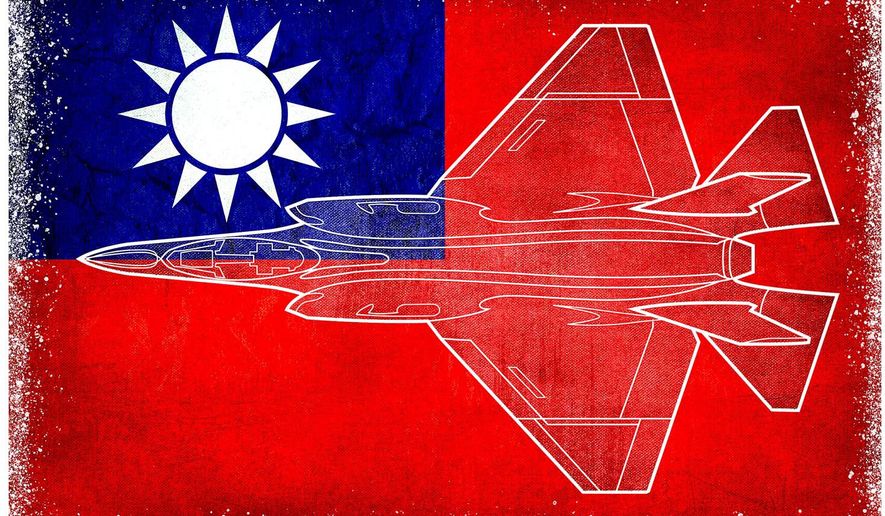OPINION:
Since the Truman presidency, the United States has preserved peace in the Taiwan Strait by arming Taiwan to deter attack from Communist China. It’s a strategy that could be continued by the Trump administration, according to early indications, by the sale of the Lockheed-Martin F-35 fifth-generation multi-role combat jet.
But after having lifted the morale of long-beleaguered Taiwan like no other president since Ronald Reagan with his December 2016 phone conversation with Taiwan President Tsai Ing Wen, President Trump tempered expectations about the F-35 sale in an April 27 interview with Reuters, saying, “I’d have to think about that.” Mr. Trump’s comment on the F-35 sale followed his statement that he has “established a good relationship with President Xi [of China] who is doing everything in his power to help us with a big situation,” referring to North Korea’s nuclear missile threat.
Now, Mr. Xi could wake up tomorrow and decide that China’s 68 years of consistent political, economic and military support for North Korea’s Kim family dictatorship was all wrong, and that China’s recent 25 years of diplomatic and technical support for Pyongyang’s nuclear and missile capabilities now threatens the Chinese people. But even if he did so, North Korea has likely had the time to nearly complete its development of small nuclear warheads and the liquid and solid fuel intercontinental ballistic missiles (ICBMs) to deliver them to American cities.
China’s tirades against the U.S. deployment to South Korea of the Theater High Altitude Area Defense (THAAD) missile interceptors to help defend South Koreans and U.S. troops stationed there from North Korean missiles likely means Mr. Xi is not going to go to war against Pyongyang. Nor is he going to diminish China’s aid to Pakistan’s nuclear missile programs and to the Iranian regime, reverse its imperialism in the South China Sea or halt its militarization of outer space.
But on the Taiwan Strait, China’s ambitions since the 1950s to destroy the non-communist, and now democratic, government on Taiwan can be arrested by continuing to arm Taiwan for a new generation of warfare. Like the United States, China is investing in what some of its strategists call “light war,” or the combining of new, powerful information warfare capabilities with new energy weapons. As it does so, China is quickly amassing Cold War-era capabilities, such as multiple warhead ICBMs, aircraft carriers and stealth bombers.
After 2020, China’s completion of a massive military reorganization, its implementation of new joint force strategies, and its accumulation of thousands of civil ferries and barges could enable China to invade Taiwan for the first time since the 1950s. But it is also possible for Mr. Trump to do what the Bush and Obama administrations failed to do: help Taiwan begin to obtain the next-generation capabilities necessary to continue to deter Chinese attack.
To be sure, Taipei is already seized with the challenge of harnessing new offensive and defensive information warfare capabilities such as data links, and may be making its own initial investments in energy weapons. But the F-35 can serve to accelerate Taiwan’s transition into the next-generation warfare capabilities required to deter Chinese attack.
In addition to a defensive and offensive combat aircraft performance better than Taiwan’s current main force of about 140 fourth-generation F-16 fighters, the F-35’s advanced radar, optical sensors, which can see missile launches at least 800 miles away, and its advanced data links, all mean it can serve as a more survivable long-range surveillance and electronic warfare platform. For Taiwan, as it will do for the air forces of the U.S., Japan and South Korea, the F-35 can help target incoming missiles, and identify air, naval and ground threats and quickly help fashion a joint-force response.
By the end of the 2020s the F-35 may also be among the first U.S. fighters to be armed with a laser weapon that can defeat air and ground-launched missiles, capabilities that Taiwan will also require.
Taiwan may only be interested in a modest number of the short take-off and vertical landing-capable F-35B. The Tsai administration wants the F-35, and its Democratic Progressive Party controls the legislature and the budget, so it is a realistic time to sell this fighter to Taiwan.
China’s Xi Jinping may yet move to defend China from North Korea’s nuclear missiles he helped to create, but that does not mean that China shares U.S. interests in the South China Sea, the East China Sea or on the Taiwan Strait. America must move to defend its interests in these areas, and selling the F-35 to Taiwan would help to preserve peace in the Taiwan Strait.
• Richard D. Fisher Jr. is a senior fellow with the International Assessment and Strategy Center.




Please read our comment policy before commenting.